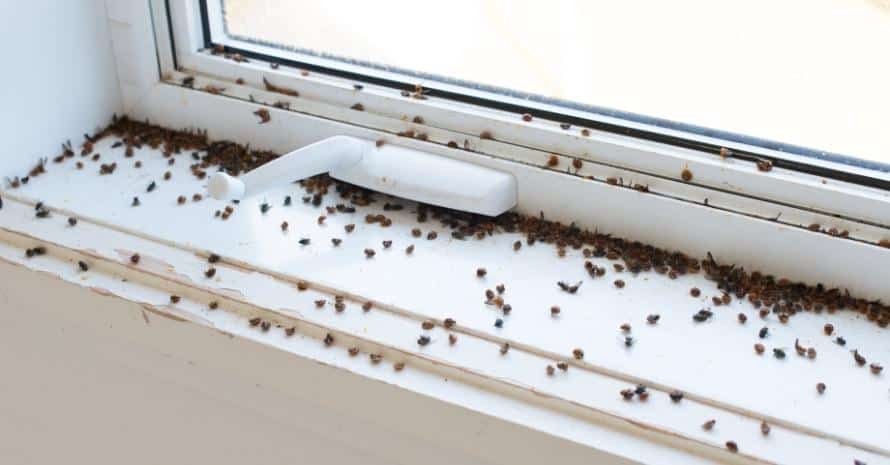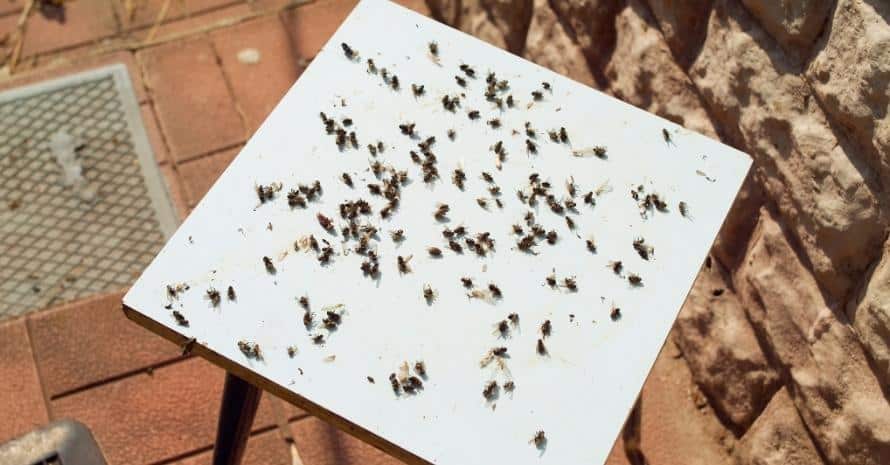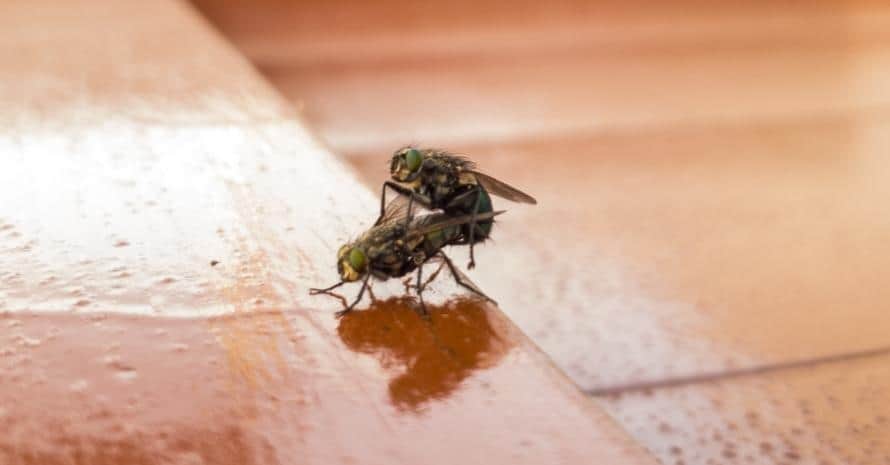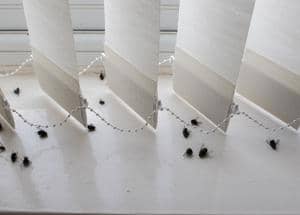The question, “Why are there so many flies in my house?” is of great importance for many people who have to look for ways to get rid of severe infestations. These insects are carriers of dangerous diseases and are also annoying.
Today you see multiple flies in the house, and in a few weeks, the number increases hundreds of times. In addition to a set of measures to get rid of the individuals that have already settled in your room, it is significant to know what attracts flies to prevent their appearance in the future.
[wpsm_titlebox title=”What Attracts Flies in My Room?” style=”main”]
- Leftover food on the table, floor, and dirty dishes in the sink.
- Rotting vegetables and fruits.
- Pet food.
- Open trash cans.
- Animal excrement.
- The bodies of dead rodents.
- Standing water.
- Clogged sewer.
- Compost piles near your home.
- Warm room temperature (75 degrees Fahrenheit or higher).
[/wpsm_titlebox]
Why Do I Have Flies in My House?

Your home is a great place for flies. Make the conditions for reproduction and survival less attractive to these insects by studying the reasons for their appearance. Let’s discover why so many flies you have in your dwelling!
1. Holes in walls, open windows, and doors
The flies perceive cracks in the walls and open doors as a “welcome” sign. Your home is warm, and these pests love such conditions so much. Therefore, if you offer them sufficient food, they will definitely drop in for a visit. Flying from the street into a human dwelling, flies find optimal conditions for development and reproduction. Indeed, their lifespan is much shorter in the wild than indoors.
2. Crumbs, rotting fruits, and vegetables
Even one ripe apple on your dinner table can attract insects and leave you confused, “Why so many flies in my apartment?”. These pesky pests are omnivores. Therefore, they may be interested in a small puddle of juice or alcohol on the table, crumbs in the house, or open food. Fruit flies love rotten vegetables and fruits.
Your sink or open dishwasher, which has accumulated a lot of dishes with food leftovers, can also become a rich food source for different species of flies. They will feed on your pet’s food if the bowl is not covered. They are most attracted to wet food.
3. Open garbage cans and compost piles
A compost pile near your home is a great chance to attract many flies indoors. Open trash cans, both outdoors and indoors, are also a limitless food source for these pests and their hatched larvae. The insects have no teeth, so rotting organic materials are delicious bait for them.
Excrement also falls under the concept of organic materials. While you may think this is not the best food option, flies have a different opinion. Your cat’s dirty litter box will attract many flying insects.
4. Standing water
Reservoirs with stagnant water can attract not only flies but also mosquitoes. It can be an outdoor pool or many plant pots in the room that you water too abundantly. Water is necessary for a fly to survive and, therefore, attracts it. However, besides water reservoirs attracting pests, such an environment is considered favorable for developing bacteria.
5. Dead rodents
If you exterminate hordes of rats in your house, this can bring another problem. It is important to throw out the corpses of rodents in time, which ate the bait with poison or fell into a trap. Not getting rid of dead pests in time has serious consequences for your health and can attract flies. These insects eat rotting flesh and lay their eggs on it.
6. Sewer problems
Leaks and clogged drains can attract not only houseflies but also drain flies. Dirty sewers accumulate large amounts of soft organic material, which is food for flies. Dark, damp places with rotting organic waste are also suitable for laying eggs.
Factors Affecting the Number of Flies

Many people fall into despair and wonder, “Why do flies keep coming into my house?”. Optimal indoor conditions allow annoying insects to go through all 4 stages of development (egg, larva, pupa, and adult) faster. Perhaps these pests have not returned to your home, and you just haven’t exterminated all the generations yet.
Air temperature
Flies reproduce rapidly: in one clutch, a female housefly can lay up to 150 eggs. In total, the fly makes 5-6 clutches in its short life. They are one of the most common pests in hot climates because they multiply faster. The optimum temperature is 75 degrees Fahrenheit and above. The heat allows these insects to lay more eggs, which shortens their development into adults.
Lack of control
You may notice a few flies and not attach any importance to their presence. Although, their appearance is a signal for action. If you have not taken a set of measures to repair and clean your home, catch flies, or have not eliminated all the reasons, insects will continue to develop and live in your home. Incorrect control can also lead to a serious infestation, and you will need the help of professionals.
FAQ About Fly Control

To successfully get rid of the invasion of these insects in your house, you need to know the basic habits of the “enemy.”
How do I get rid of a fly infestation in my house?
Seal all cracks in doors, windows, and walls. Fix leaks. Store all food in airtight containers and wipe down your dining table regularly. Waste bins must be tightly closed. Set fly traps in places where flies accumulate.
Where are all the flies in my house coming from?
The most common species, such as houseflies and fruit flies, typically inhabit people’s homes, restaurants, and markets. They prefer to live near dunghills and garbage cans.
Where do flies lay eggs in the house?
For laying eggs, the female chooses dark, damp places with enough organic food for future larvae. It could be rotting wood, a dead animal, sewers, or a trash can.
Free Your House From Flies
Your home may seem cozy and attractive not only to you but also to flies. Trying to survive and find a place to reproduce, annoying insects get into the house. It seems that the liquidation of hordes of flies is difficult. However, this is not the case if you carefully consider a plan to eliminate them. It is also crucial to determine how the flies entered the room to prevent a serious infestation.
Have you ever had to deal with a huge number of flies in your home? How soon did you get rid of them, and by what methods?
Also read:
- How to Prevent Fruit Flies: Getting Rid of Home Pests Advice
- How to Get Rid of Horse Flies Around the Pool: Complete Control & Prevention
- How to Get Rid of Flies in Garage: Causes, Traps, and Prevention
- How to Trap a Gopher: A Humane and Effective Method
- How to Collapse Gopher Tunnels: A Guide to Control & Prevention
References:
- A systematic review of human pathogens carried by the housefly (Musca domestica L.) (Faham Khamesipour, Kamran Bagheri Lankarani, Behnam Honarvar & Tebit Emmanuel Kwenti) https://bmcpublichealth.biomedcentral.com/articles/10.1186/s12889-018-5934-3
- How to Clean a Kitchen Drain (Chris Willatt)
https://www.wikihow.com/Clean-a-Kitchen-Drain - Flies, roaches not likely to spread COVID-19, study shows (Texas A&M AgriLife Communications) https://www.sciencedaily.com/releases/2022/07/220728091032.htm
- Bacteria (Britannica)
https://www.britannica.com/science/bacteria - Drain Flies or Moth Flies (University of Kentucky College of Agriculture) https://entomology.ca.uky.edu/ef615

